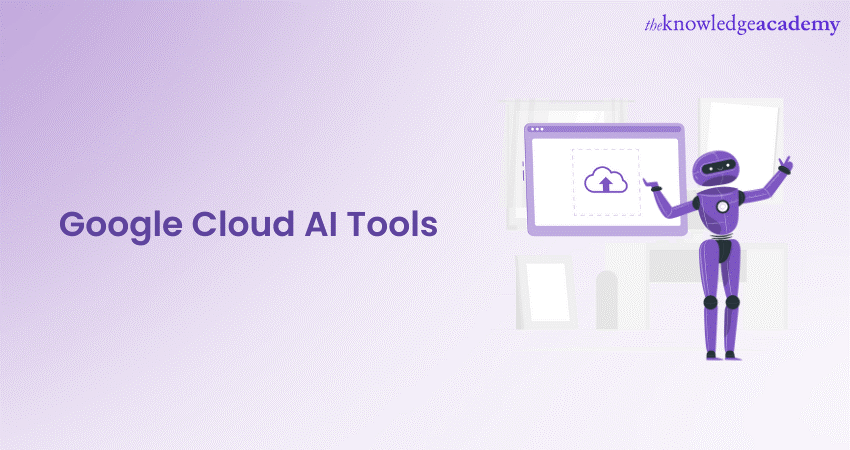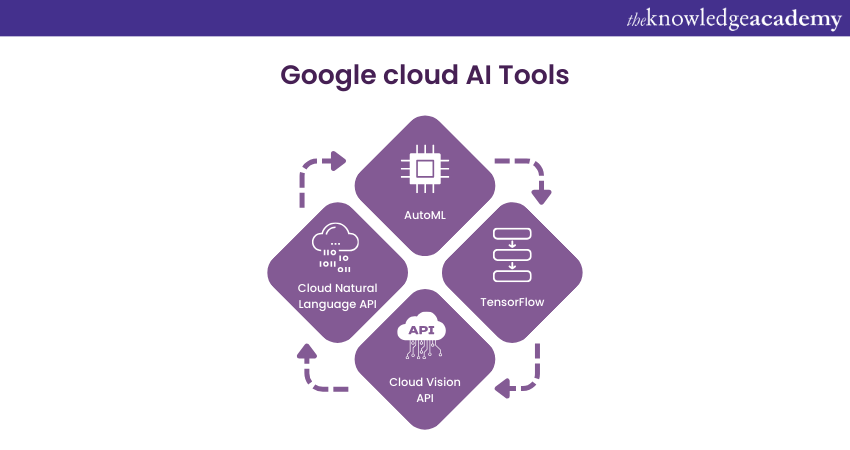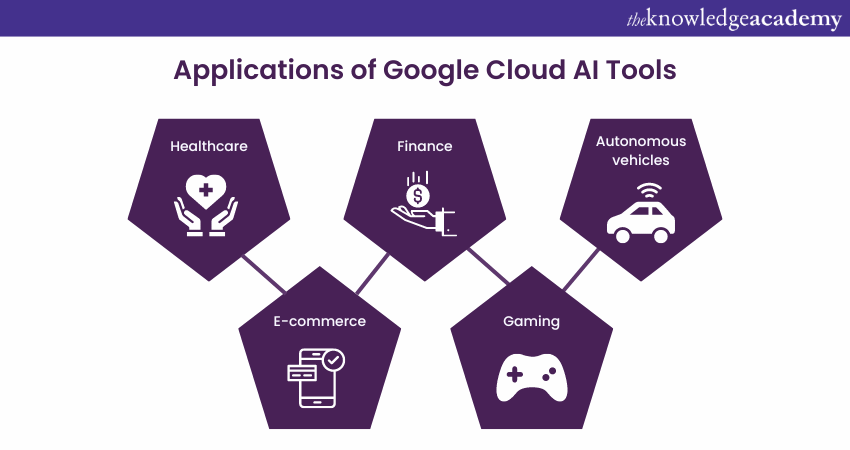We may not have the course you’re looking for. If you enquire or give us a call on +44 1344 203999 and speak to our training experts, we may still be able to help with your training requirements.
Training Outcomes Within Your Budget!
We ensure quality, budget-alignment, and timely delivery by our expert instructors.

Artificial Intelligence (AI) has become a transformative power, reshaping industries and driving innovation. At the forefront of this AI revolution is the Google Cloud AI Tools that have garnered significant attention for their capabilities and ease of use.
These tools empower Developers, Data Scientists, and businesses to harness the power of cutting-edge technologies like AI. Google Cloud AI Tools encompasses a diverse range of tools designed for different professionals, from researchers to developers. Read this blog to learn more about CGP AI Tools.
Table of Contents
1) What are Google Cloud AI Tools?
2) Key features of Google Cloud AI Tools
3) Popular Google Cloud AI Tools
4) Use cases and applications of Google Cloud AI Tools
5) Conclusion
What are Google Cloud AI Tools?
Google Cloud AI Tools encompass a wide array of services and APIs designed to facilitate Machine Learning and AI development. These tools leverage the immense computing power and data processing capabilities of Google Cloud Platform (GCP) to provide scalable and efficient AI solutions.
The primary objective of these tools is to democratise AI, making it accessible to both experts and novices alike. From beginners experimenting with AI models to enterprises deploying advanced AI systems, Google Cloud AI Tools cater to various use cases with unparalleled ease.

Key features of Google Cloud AI Tools
Google Cloud AI Tools offer a rich set of features that empower developers and businesses to build sophisticated AI-driven applications. Some key features of Google Cloud AI Tools include:
1) Scalability and performance: GCP's infrastructure ensures high scalability and performance, enabling AI models to handle large datasets and serve millions of requests efficiently.
2) Pre-trained models: Many AI Tools come with pre-trained models, saving time and resources in building models from scratch. These models cover various tasks like image recognition, language translation, and more.
3) AutoML capabilities: AutoML simplifies Machine Learning model development for non-experts. It automates tasks like feature engineering, hyperparameter tuning, and model selection, making AI more accessible.
4) Customisation: While pre-trained models are convenient, Google Cloud AI Tools also allow customisation. Developers can fine-tune models to fit specific use cases, ensuring optimal performance.
5) Natural Language Processing (NLP): NLP tools analyse text data, providing sentiment analysis, entity recognition, and syntax parsing, making it easier to extract valuable insights from textual content.
6) Computer vision: AI Tools support computer vision tasks, enabling image and video analysis. Developers can build applications for object detection, image classification, face recognition, and more.
7) Speech recognition and synthesis: GCP offers Speech-to-Text and Text-to-Speech APIs, allowing developers to create applications with voice-based interactions and speech synthesis capabilities.
8) Multilingual support: Language should never be a barrier. AI Tools offers multilingual support, facilitating real-time language translation and enabling global applications.
Prepare for success with our guide on Google Cloud interview questions! Get insights and tips to ace your interview and land your dream cloud role!
Popular Google Cloud AI Tools
GCP offers a range of powerful AI Tools that empower developers and businesses to build intelligent applications. Let’s explore some of the key Google Cloud AI Tools:

1) AutoML: This automated Machine Learning service allows users to develop custom Machine Learning models without any expertise in the field. AutoML simplifies the model development process and accelerates the deployment of AI solutions.
2) TensorFlow: As an open-source Machine Learning library, TensorFlow has gained massive popularity for its adaptability and flexibility. It supports a wide range of tasks, especially in Deep Learning, and enables the development of complex AI models.
3) Cloud Vision API: With the Cloud Vision API, developers can integrate image recognition and analysis capabilities into their applications. This tool enables the identification of objects, faces, and landmarks in images, opening up various use cases in computer vision.
4) Cloud Natural Language API: This API offers powerful Natural Language Processing (NLP) capabilities, including sentiment analysis, entity recognition, and syntax analysis. It allows developers to extract insights from text data and build applications with advanced language understanding.
5) Cloud Speech-to-Text and Text-to-Speech APIs: These APIs provide speech recognition and synthesis functionalities, making it possible to incorporate speech-based interactions into applications, such as voice assistants and voice-activated commands.
6) Cloud Translation API: The Cloud Translation API facilitates real-time language translation, enabling developers to create multilingual applications easily. It supports translation between numerous languages, bridging communication gaps across the globe.
7) Cloud AI Platform: This unified platform is designed to streamline the end-to-end process of building, training, and deploying machine learning models at scale. It provides a cooperative environment for data scientists and engineers to work together efficiently.
8) Dialogflow: As a natural language understanding platform, Dialogflow enables the creation of conversational interfaces and chatbots. It simplifies the development of interactive and user-friendly AI-powered applications.
These key Google Cloud AI Tools, among others, form a comprehensive suite that caters to various AI and Machine Learning needs. Whether for image analysis, language processing, or building intelligent chatbots, these tools provide the essential building blocks for creating innovative and impactful AI-driven solutions.
9) ML Kit: ML Kit is a helpful tool for mobile app developers. When creating a large-scale product, it's important to consider the interests of consumers. The most effective way to achieve this is by tracking events, conducting surveys, and more. Google offers a great tool for these purposes called Google Firebase. It enables the Google Cloud Storage and processing of large amounts of user data, along with lightweight analytics and synchronisation with Big Query (a data warehouse) and Google Data Studio (a business intelligence tool).
10) Google Open Source: Open source philosophy has become increasingly popular in recent years. It allows individuals to modify and improve existing technology according to their needs. You can easily access the full repository and conduct experiments to enhance the technology. The active community is always there to provide advice, participate in the development process, and contribute their own upgrades. Sharing the results of your experiments can lead to a better overall outcome.
11) CoLaboratory: If you have experience with Python programming, you might be familiar with Jupyter Notebook, a popular study tool. It's a highly demonstrative tool that supports various add-ons and instruments. However, there's always room for improvement. Sometimes, it can be challenging to share and work on a single file, since proper installation of libraries and addressing language dependencies can be an issue. To address this, Google created CoLaboratory - Jupyter on Google Drive. It is primarily designed to make it easier for users to run and share Jupyter notebooks, which are interactive documents containing code, explanations, and visualisations.
12) Virtual Machines for data science: Virtual machines (VMs) for data science are cloud-based computing instances that provide a flexible and scalable environment for performing data analysis, Machine Learning (ML), and other data-related tasks. These virtual machines are designed to meet the specific requirements of data scientists, analysts, and engineers.
Unleash the potential of real-time data processing and analysis with our Google Cloud Dataflow Training – Sign up now!
Use cases and applications of Google Cloud AI Tools
Google Cloud AI Tools find extensive applications across various industries, revolutionising processes and driving innovation. Here are some key use cases and applications:

1) Healthcare: AI-powered tools aid in disease diagnosis, medical imaging analysis, and drug discovery, enhancing patient outcomes and speeding up research.
2) E-commerce: AI-powered recommendation systems improve personalised shopping experiences, boosting customer engagement and sales.
3) Finance: AI-based fraud detection algorithms identify suspicious transactions, ensuring secure financial transactions and minimising risks.
4) Gaming: AI is used to create intelligent Non-Player Characters (NPCs) and enhance gaming experiences through dynamic storytelling and behaviour.
5) Autonomous vehicles: Computer vision algorithms enable autonomous vehicles to safely perceive and navigate their surroundings.
Unlock your cloud engineering potential! Follow our How to become a Google Cloud Engineer guide to gain the skills needed for success in the cloud industry!
6) Customer support: NLP-powered chatbots provide efficient, round-the-clock customer support, resolving queries and improving user experiences.
7) Language translation: Real-time language translation services enable seamless communication between individuals speaking different languages.
8) Manufacturing: AI-driven predictive maintenance reduces downtime and optimises production procedures, leading to cost savings and increased efficiency.
9) Agriculture: AI Tools analyse data from drones and sensors to optimise crop yield, water usage, and pest control.
10) Education: AI-based adaptive learning platforms tailor educational content to individual students, promoting personalised learning experiences.
These use cases highlight the versatility and impact of Google Cloud AI Tools, demonstrating how they address complex challenges and bring value to diverse industries and domains.
Propel your career to new heights with our Big Data And Machine Learning With Google Cloud Platform Training – Sign up today!
Conclusion
We hope you read and understand Google Cloud AI Tools. These tools have proven to be a game-changer, democratising Artificial Intelligence for developers and businesses alike. With their powerful features and versatile applications, these tools pave the way for a future defined by intelligent, data-driven solutions.
Level up your cloud expertise with our Google Cloud Training – Sign up now!
Upcoming Data, Analytics & AI Resources Batches & Dates
Date
 Google Cloud Platform Fundamentals
Google Cloud Platform Fundamentals
Fri 28th Mar 2025
Fri 23rd May 2025
Fri 4th Jul 2025
Fri 5th Sep 2025
Fri 5th Dec 2025







 Top Rated Course
Top Rated Course


 If you wish to make any changes to your course, please
If you wish to make any changes to your course, please


